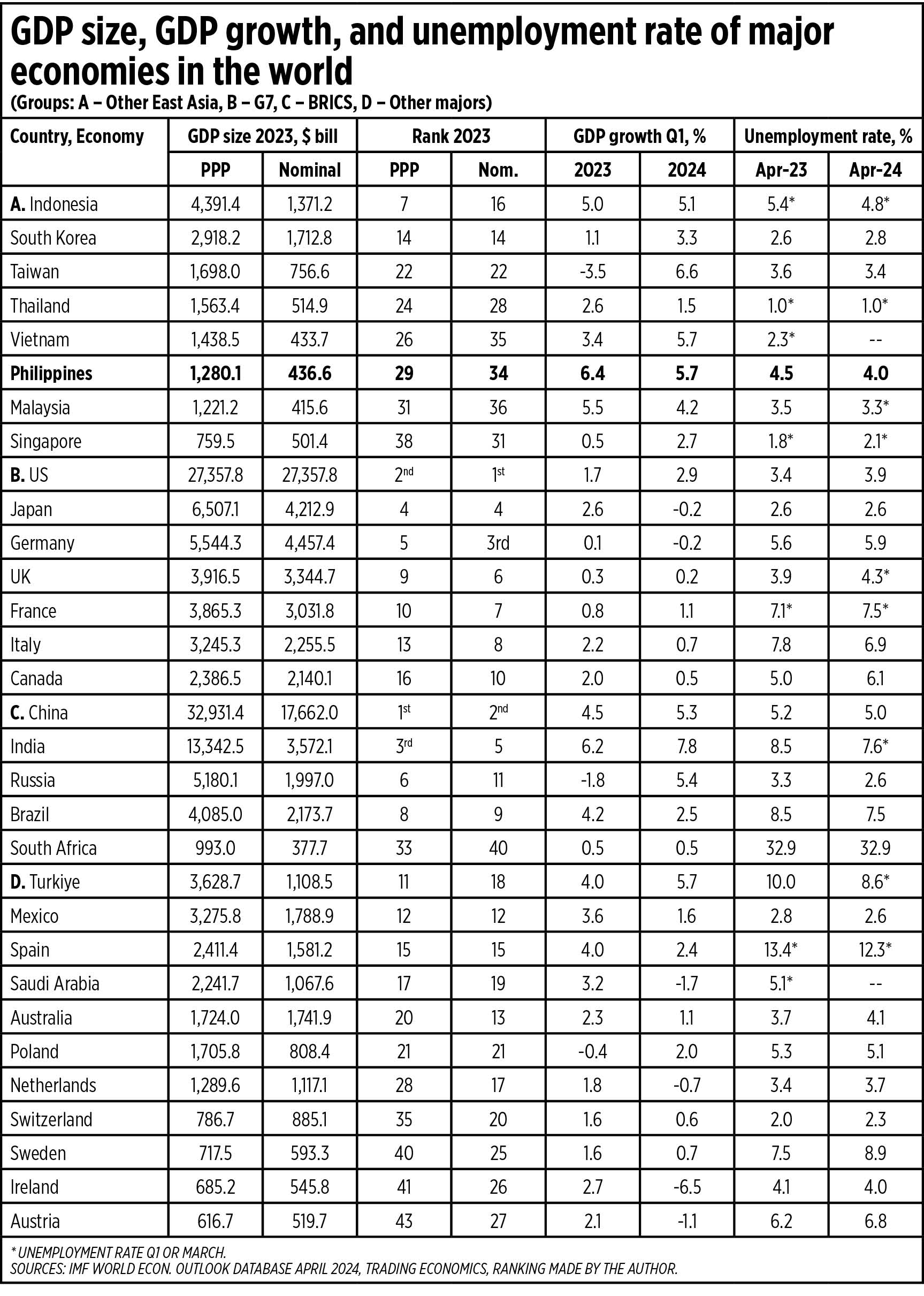Declining growth and rising unemployment: East Asia vs Europe
Now that most major economies in the world have reported their first quarter (Q1) 2024 GDP performance, I will resume my global economic scanning. Major economies are those with GDP size at Purchasing Power Parity (PPP) value of $600 billion and higher in 2023, and there are 43 of them.
For the purpose of brevity, I will not show all the 43 countries in the accompanying table. I excluded some due to their incomplete data in GDP growth and unemployment, plus I limited the list of European countries. The countries I excluded along with their respective rank in GDP-PPP are: Egypt 18, Iran 19, Pakistan 23, Bangladesh 25, Nigeria 27, Argentina 30, Colombia 32, the United Arab Emirates 34, Romania 36, Belgium 37, Algeria 39, and Kazakhstan 42.
I used a country’s GDP size both in Nominal and PPP values then ranked them. The Nominal values are GDP in national currencies divided by the average US$ exchange rate, while the PPP values consider the cost of living. I also included these countries’ GDP growth in Q1 2023 vs Q1 2024, and their unemployment rate in April 2023 vs April 2024 unless specified as March or Q1.
As seen in the table, the Philippines is doing fine. In 2023 GDP size, it ranked 34th in Nominal value but ranked higher at 29 in PPP value. In GDP growth, the Philippines was ranked as the 3rd fastest growing among 43 economies in 2023, next to India and Bangladesh. It was also the 3rd fastest among the 36 economies that reported their Q1 2024, next to India and Taiwan. And the unemployment rate showed improvement, from 4.5% in 2023 to 4% this year. This is a good achievement and shows good management by the Philippine economic team. Thank you, Finance Secretary Ralph G. Recto, Budget Secretary Amenah F. Pangandaman, and Economics Secretary Arsenio M. Balisacan.
In 2024, growth deceleration is evident in most of the G7 industrial countries except the US and France, with the latter having escaped deceleration but growing at only 1%. Japan and Germany have contractions this year. Growth deceleration, if not contraction, is also evident in other major economies except Turkey. Poland’s growth this year is due to base effect — it had contraction in Q1 2023. The worst contraction this year is seen in Ireland, Saudi Arabia, Austria, and the Netherlands.
The unemployment rate increased in G7 countries except Italy, while Japan had no change. Other major economies also showed an increase in their unemployment rate, or a slight decrease but still at high levels like Spain with 12%, Turkey with 8.6%, and Poland with 5%.
The BRICS countries — Brazil, Russia, India, China, and South Africa — have accelerated their growth this year except for Brazil and South Africa. They also have decreased their unemployment rate, except for South Africa.
East Asian nations in general have faster growth this year except for Thailand and Malaysia. The Philippines’ 5.7% growth this year is lower than that of last year, but it is still the third fastest among the major economies. Unemployment rates are either declining or remain at low levels (see the table).
What are the implications and opportunities for the Philippines of these global economic trends?
I see one path here — the slow migration of businesses from the G7 countries and other major economies to their smaller neighboring countries in America and Europe, and to East Asia including the Philippines.
Currently there are three major policy mistakes that afflict the G7 countries and other major economies. One, the mass immigration of illegals that sap the developed countries’ social and economic resources. Two, expensive and unstable energy from the use of more intermittent sources that require more backup power from fossil fuel and nuclear plants, plus imported energy from neighbors. And, three, the endless war in Ukraine that pulls the developed countries’ fiscal resources and further raises their public debt.
The Philippines and neighboring East Asian countries should avoid or minimize these pitfalls. One, they should encourage only legal, vetted migration and disallow unvetted illegal migration. Two, they should keep their fossil fuel plants plus nuclear, expand their power supply big time, and anticipate high power demand in the coming years. And, three, step away from taking sides in ongoing major military conflicts between the US vs. Russia in Ukraine, the US vs. China in Taiwan and the South China Sea, and the US-Israel vs. Iran in Palestine and Syria.


No comments:
Post a Comment